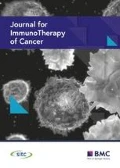Blocking DLL4, a Notch ligand, effectively inhibits tumor growth by increasing non-functional angiogenesis and decreasing the cancer stem cell (CSC) population. Preclinical studies have demonstrated inhibition of tumor growth by anti-DLL4 treatment and have led us to enter demcizumab, an anti-DLL4 mAb, into ongoing clinical trials. Vascular endothelial growth factor A (VEGF A) also plays a central role in inducing tumor angiogenesis. VEGF signaling is also involved in recruiting immune suppressive myeloid cells. Therefore, targeting VEGF could induce favorable immune responses against cancer. We developed a bispecific monoclonal antibody that blocks both DLL4 and VEGF which is in Phase I clinical trials. In the present study we compare the impact of anti-DLL4 in combination with anti-VEGF and anti-DLL4 in combination with anti-VEGF and anti-Programmed Cell Death Protein 1 (PD1) on anti-tumor immune responses. Our data demonstrate that the triple blockade of DLL4-VEGF-PD1 significantly inhibited tumor growth with more pronounced tumor regression. Anti-DLL4 treatment reduced IL17 production, an effect not observed with anti-PD1, blockade of DLL4-VEGF or DLL4-VEGF-PD1, suggesting that blocking DLL4 alone and together with VEGF or VEGF and PD1 might have different mechanisms for regulating immune responses. Anti-PD1 increased specific CD8+ T cell-mediated IFN-gamma production while decreasing IL6. Interestingly, IL2 was increased at the tumor site by blockade of DLL4-VEGF-PD1 compared to controls. Since IL2 is required for secondary population expansion of CD8+ memory T cells, increased IL2 in the triple combination group suggests potential for increased T cell activation, maintenance and memory T cell function, as compared to single agent anti-DLL4 and anti-PD1. Memory CD8+ T cell frequencies were increased within the total CD8+ T cell population by DLL4-VEGF-PD1 triple blockade. Therefore, these results show that co-targeting of DLL4 and VEGF with PD1 might be an effective and durable anti-cancer therapy in part by promoting anti-tumor immune responses and inhibiting pro-tumor immune responses.
Author information
Authors and Affiliations
Rights and permissions
This article is published under an open access license. Please check the 'Copyright Information' section either on this page or in the PDF for details of this license and what re-use is permitted. If your intended use exceeds what is permitted by the license or if you are unable to locate the licence and re-use information, please contact the Rights and Permissions team.
About this article
Cite this article
Srivastava, M., Murriel, C., Yun, R. et al. Co-targeting of delta-like ligand 4 (DLL4) and vascular endothelial growth factor a (VEGF) with programmed death 1 (PD1) blockade inhibits tumor growth and facilitates anti-tumor immune responses. j. immunotherapy cancer 3 (Suppl 2), P373 (2015). https://doi.org/10.1186/2051-1426-3-S2-P373
Published:
DOI: https://doi.org/10.1186/2051-1426-3-S2-P373

